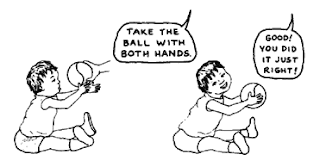I am not going to put the whole argument or rationale up here, it is too long - but if you would like to read it in full, the link is
http://blog.kidzui.com/2011/07/28/seven-ways-praise-can-do-harm-and-what-we-can-say-or-do-instead/.
I don't know about you, but when I sat and thought about what was said on the blog, I found myself disagreeing without any uncertainty. I cannot imagine going through life without once getting a pat on the back for something which you have done and are proud of. Hey! Why do they give Olympic athletes gold medals? And put them on a podium? It is a huge " well done" - it is recognition of their hard work and effort as well as the fact that they won, or won a place. One man said :
“I was praised too much and ended up feeling like a trained seal. To this day, I want outside acknowledgement for every task, no matter how trivial.”
I want to make a note here, which I believe is very important - he says "I was praised TOO MUCH". In other words, indiscriminately. Now, I don't know about you, but that to me is a huge tell - there is such a thing as too little and such a thing as too much. There is no point in praise for every tiny thing, and it isn't required anyway. My belief is that the type of mother who praises indiscrimately is the one you will all recognise - the mum who believes her children can do NO wrong. And that type of mothering is more smothering than anything else. We all know what it leads to as far as her children's behaviour is concerned.
My guess is that the vast majority of us are sensible about what we offer praise for - and that the children understand that we are praising their hard work and achievement - contrary to what the psychiatrists say. Their findings say that :
1) Praise implies judgment.
2) Praise is a form of manipulation (and kids eventually learn to recognize it).
3) Praise creates “praise junkies” and lowers self-esteem
4) Praise steals a child’s pleasure.
5) Praise focuses on the end result, not the process
6) Praise is often inaccurate.
7) Praise reduces achievement
 | |
| Good Effort! |
Some of their points I do agree with, but on examining what we actually do or say in praise and acknowledgement of (for example) Fifi's achievements, then I honestly believe we have a good balance. We don't praise indiscriminately, nor do we praise simply to get her to comply with our wishes (the manipulation). We do try to always tell her what we are praising for, but on the other hand we don't withold praise if she has tried hard and not achieved her goal. We applaud the fact that she has tried. She tried for many months to put her shoes on the right feet, and finally did it! She asks us "is this right?" and we tell her yes, and well done, you have remembered which foot is which. And that is a difficult thing to do.
I do not agree that praise implies judgment! Nor do I agree that it lowers self-esteem. Again, what they seem to be talking about is indiscriminate praise.
Help me out here please? Maybe I am missing something, but referring back to the man who said he "felt like a trained seal" - surely training your children is what we are all about? Teaching, training, whatever label you want to put on it? What do you think, because I would be really very interested in other people's opinions about this.
Please feel free to comment, I welcome comments from anyone! Thank you for taking the time to read my blog.


1 comment:
I agree completely with you we are 'training' our children to know whats right and wrong ... I believe in showing Kyle a big difference between the two so that he strives to do the right thing as he likes to be praised ... I cant see the wrong in that x
Post a Comment